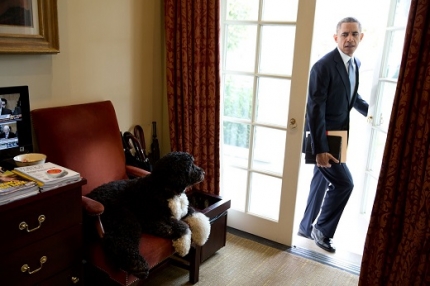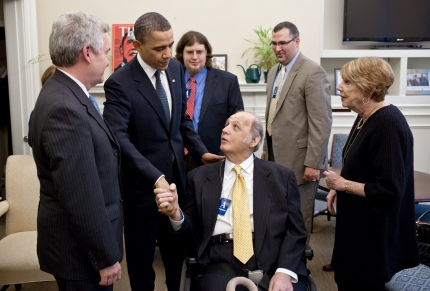FACT SHEET: U.S. Support for Combating Wildlife Trafficking
Like other forms of illicit trade, wildlife trafficking undermines security across nations. Well-armed, well-equipped, and well-organized networks of criminals, insurgent elements, and corrupt officials exploit porous borders and weak institutions to profit from trading in poached wildlife.
Record high demand for illegally traded wildlife products, coupled with inadequate preventative measures and weak institutions, has resulted in an explosion of illicit trade in wildlife in recent years. That trade is decimating iconic animal populations. Today, because of the actions of poachers, species such as elephants and rhinoceroses face the risk of significant decline or even extinction.
Over the past five years, tens of thousands of elephants have been slaughtered by poachers and criminal networks in Africa. In 2013, more than 1,000 rhinos were killed in South Africa alone, and the pace of killing is on track to surpass this record in 2014. Urgent action is needed now and the United States is providing leadership and commitment to protecting our world heritage and endangered wildlife.
In recognition of the importance of combating wildlife trafficking to the United States and our African partners, the U.S.-Africa Leaders Summit included a Dialogue on Combating Wildlife Trafficking Signature Event that addressed best practices and next steps for addressing this international crisis, to include inspiring youth to confront the issue. President Gnassingbé of the Togolese Republic, President Pohamba of the Republic of Namibia, President Bongo Ondimba of the Gabonese Republic, and President Kikwete of the United Republic of Tanzania were featured in the event, due to their roles in combating the illegal trade on the continent.
A Coordinated Strategy
National Strategy for Combating Wildlife Trafficking. In February 2014, President Obama issued a National Strategy for Combating Wildlife Trafficking. The Strategy identifies three priorities for stemming illegal trade in wildlife: (1) strengthening domestic and global enforcement; (2) reducing global demand; and (3) building international cooperation and partnerships. In 2014, the United States will invest more than $60 million in support of these efforts.
-
A Presidential Task Force on Combating Wildlife Trafficking, chaired by senior officials at the Department of State, the Department of the Interior, and the Department of Justice, is charged with implementing the Strategy and includes broad interagency representation from other relevant departments and agencies.
-
The Task Force is supported by the Advisory Council on Wildlife Trafficking, an 8-member body that makes recommendations to the Task Force and provides it with ongoing advice and assistance. The Advisory Council is comprised of leaders from the private sector and nonprofit organizations, and former government officials. Along with the Task Force, it was formed pursuant to the President’s Executive Order of July 1, 2013 that charted a path forward to increase U.S. efforts to counter poaching and the illegal wildlife trade.
Strengthening Enforcement
The United States has worked with African governments for years to strengthen their capacity to fight wildlife trafficking. We also help protect Africa’s natural resources by prosecuting criminals who traffic in endangered and protected species in the United States, including those trafficking endangered rhinoceros horn and elephant ivory.
U.S. Efforts with Partners Overseas. Across Africa, the United States supports partner institutions in building their capacity to better protect natural resources and bring criminals to justice. Key capacity building efforts focus on: improving cross-border cooperation; strengthening wildlife trafficking laws; enhancing wildlife management both inside and outside protected areas with government and communities; and providing critical training to rangers, community scouts, police, customs officials, prosecutors, and judges. Through the International Law Enforcement Academy, the State Department, along with the Department of the Interior’s U.S. Fish and Wildlife Service (USFWS) and the Department of Justice, have trained more than 450 law enforcement officers in Africa and Asia.
-
Establishing Wildlife Enforcement Networks. For the last decade, the State Department and U.S. Agency for International Development (USAID) have worked with our partners to build active coordination and improve information sharing by establishing regional Wildlife Enforcement Networks (WENs) in Southeast Asia, South Asia, Central America, and the Horn of Africa. We are supporting efforts to establish WENs in Central and Southern Africa and stationing USFWS agents in Africa, Asia, and South America to partner with the WENs and assist enforcement efforts.
-
Supporting Community-Based and Partner Solutions. USAID has doubled its efforts to address this crisis, investing $26 million in Africa in fiscal year 2014 alone to develop new solutions by working with local communities, governments and other partners. For example, USAID supported a tripling of ranger enrollment at a Kenyan Field Training School in 2012, which, combined with a recent training helped more than 300 young men from northern Kenya become conservation rangers in their pastoralist communities. Long-term investments in community conservation increase habitat under conservation, build capacity of community scouts and rangers, and develop livelihood and economic opportunities for local communities through conservation based enterprises. Many countries with strong community conservancies have recorded a below average or no loss of wildlife from poaching in these areas.
-
Leveraging Rewards. In November 2013, Secretary of State Kerry announced the first reward offer under the Transnational Organized Crime Reward Programs to combat wildlife trafficking. This reward offers up to $1 million for information leading to the dismantling of the Xaysavang Network, a transnational crime syndicate facilitating wildlife trafficking from Africa and Asia.
-
Pursuing Global Operations. In early 2014, the United States also worked with governments across Africa and Asia on Cobra II, a global cooperative effort to combat wildlife poaching and trafficking. Cobra II brought together police, customs, and wildlife officials from 28 countries and resulted in hundreds of arrests and major seizures of trafficked wildlife and wildlife products.
U.S. Efforts at Home. Our domestic enforcement efforts complement and support the work that the United States does around the globe in partnership with foreign nations. United States law prohibits smuggling into or trafficking in the United States of plants or animals that were killed in violation of the wildlife laws of other nations as well as those protected under U.S. law or international treaties. We take wildlife crime seriously and are committed to making wildlife traffickers pay for their crimes.
-
Operation Crash. One current example of U.S. enforcement operations targeting those who exploit Africa’s natural resources is Operation Crash, an ongoing U.S. Fish and Wildlife Service investigation into the rhinoceros horn trade. With enforcement support from 40 U.S. states and 10 foreign nations, federal investigators have taken down several sophisticated, international criminal networks, and their investigations continue. Defendants have been convicted of numerous offenses, including conspiracy, smuggling, money laundering, and bribery, are receiving significant jail terms, and have already forfeited millions in illegal wildlife, gold bars, luxury vehicles, and currency.
-
Smuggling Conviction Example. In a recent case, a defendant who smuggled newly acquired elephant ivory from West Africa into the United States, disguising and selling it as antique, was sentenced to 30 months in prison and forfeited $150,000 as well as approximately one ton of ivory -- one of the largest known caches of illegal ivory ever seized in the United States.
-
Additional U.S. Enforcement Actions. Specially trained USFWS Wildlife Inspectors work side-by-side with U.S. Customs & Border Protection (CBP) officers and agricultural specialists at our ports of entry to detect and identify illegally traded wildlife products. USFWS has agents dedicated to investigating perpetrators and bringing them to justice. This year, we significantly enhanced our wildlife trafficking detection capabilities by integrating USFWS officers into CBP’s Commercial Targeting Analysis Center, thereby combining the specialized knowledge that resides within the wildlife trafficking enforcement realm with the powerful tools and analysis capabilities of CBP. In addition, U.S. Immigration and Customs Enforcement, Homeland Security Investigations continue to investigate wildlife trafficking in coordination with USFWS and National Oceanic Atmospheric Administration (NOAA). Earlier this year USFWS posted a Federal Agent at the U.S. Embassy in Bangkok to serve as a liaison on wildlife trafficking investigations in Southeast Asia. We are actively pursuing additional regional postings in Africa.
Reducing Demand for Illegally Traded Wildlife
The United States recognizes that, for illegal wildlife killing to stop, we must address the consumer demand that drives poaching. To this end, we are funding public awareness campaigns and public service announcements featuring prominent celebrities and local leaders to reduce the demand in Asia. We are engaging the transportation sector, online retailers, and the tourism industry to leverage their considerable power to aid our efforts, and we are expanding U.S. ivory trade controls to achieve a near total ban on the commercial trade of elephant ivory.
-
Near Complete Ban on U.S. Ivory Trade. USFWS has already issued a Director’s Order that instructs U.S. Fish and Wildlife Service personnel to strictly enforce existing restrictions on the import of elephant ivory and on the import, export and sale of items made from other protected species under the “antiques exception” of the Endangered Species Act. In addition, USFWS has published regulations prohibiting the sale of all elephant ivory within the United States unless the seller can demonstrate that the ivory was lawfully imported prior to 1990 for African elephants and 1975 for Asian elephants, or was imported under an exemption document. USFWS will also publish a proposed rule later this year to strengthen Endangered Species Act protections for African elephants, particularly by further restricting domestic sale and export of African elephant ivory and limiting the number of legally-allowed African elephant sport-hunted trophies that an individual may import to two per hunter per year. We hope these actions will inspire other nations to take similar steps. Additionally, USAID has focused efforts on behavior change and support for public awareness campaigns to reduce demand for wildlife in Thailand, Vietnam and China. For example, campaigns use local celebrities and high-profile government officials in public service campaigns to create a groundswell of public opinion against wildlife purchases.
Expanding International Cooperation
The United States will continue to lead global efforts to protect the world’s iconic animals, many of which live in Africa, and preserve our planet’s wildlife for future generations. But we cannot do it alone. Combating wildlife trafficking will require the shared understanding, commitment, and efforts of the world’s governments, intergovernmental organizations, NGOs, corporations, civil society, and individuals.
-
U.S. Efforts in Multilateral Fora. The United States is working to persuade U.N. Member States to treat wildlife trafficking as a “serious crime” as defined in the U.N. Convention against Transnational Organized Crime. We have advocated for countries to work together against wildlife trafficking in a number of multilateral fora, including Asia-Pacific Economic Cooperation (APEC), Association of Southeast Asian Nations (ASEAN), the G-7, the U.N. General Assembly, the U.N. Environment Assembly, the U.N. Office on Drugs and Crime, and the U.N. Commission on Crime Prevention and Criminal Justice. We worked with our mission to the United Nations to secure the inclusion of language to address wildlife trafficking in two Security Council Resolutions sanctioning African armed groups, which were adopted in January 2014.
-
U.S.-Bilateral Efforts. Bilaterally, the United States partners with many African governments to support national and local efforts to protect and sustain their wildlife and develop their own multifaceted national strategies. We are expanding our efforts to raise the problem of wildlife trafficking at all levels of our bilateral diplomatic and development engagement with foreign governments. U.S. Ambassadors and USAID Mission Directors in African countries and other State Department and USAID principals continue to partner with African countries to work to protect their wildlife and prevent trafficking and the corruption it breeds.
-
Wildlife Trafficking Tech Challenge. USAID will soon launch the Wildlife Trafficking Tech Challenge to seek innovative technology solutions to shut down transit routes, improve forensic and intelligence gathering tools, address consumer demand, and combat corruption along the illegal supply chain.



